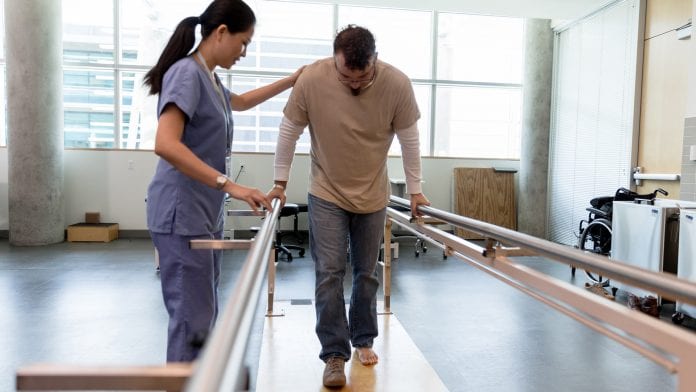
A new report into the impact of COVID-19 on stroke survivors has found that delayed 999 calls due to concerns around COVID-19 have left stroke survivors with avoidable disabilities.
The ‘Stroke recoveries at risk’ report, carried out by The Stroke Association and based on the experiences of 2,000 stroke survivors, has shown that concerns around the pandemic, unavailable treatments, and cancelled rehabilitation therapies have left thousands of stroke survivors with avoidable and unnecessary disability and mental health problems, taking a devastating toll on families.
Although NHS stroke services remained open throughout lockdown, the report shows that stroke care is on the precipice of a national crisis and risks thousands of stroke survivors’ hard-earned recoveries slipping backwards. The Stroke Association is now calling for immediate action from governments and local health systems across the UK to stem a ‘rising tide’ of demand on the NHS and UK health services that could ‘take years to solve’ if left unchecked.
Caring for stroke survivors during COVID-19
With enough physio, occupational, speech and language therapies, and mental health support, stroke survivors can recover, but only if governments and local health systems act now, says the charity. There are 1.2 million stroke survivors living in the UK and over 100,000 strokes every year, making stroke the leading cause of adult disability. The Stroke Association estimates that there are over 35,000 stroke survivors who had a stroke during the pandemic and who require more support.
The Stroke Association is calling for:
- All community rehabilitation, such as physiotherapy, speech and language therapy, and occupational therapy to meet national clinical guideline levels to ensure all stroke survivors can access the vital support they need and should be receiving
- Stroke teams to follow up with all stroke survivors who had a stroke this year to make sure they have not been abandoned and are in line to receive the support they need to help them recover and cope with the effects of their stroke
- Health and care systems to prioritise increasing the provision of and access to mental health services to stem the significant emotional and psychological effects of experiencing a stroke, which have only been made worse during the pandemic period with thousands of people left extremely anxious and isolated
- Governments and local authorities should provide adequate support to carers to cope with the additional pressures of COVID-19 to ease the burden of constant, round-the-clock caring for loved ones with even less support than normal
As outlined in the Stroke Association’s Lived Experience of Stroke report (Oct 2019), the level of care, rehabilitation, and mental health support available was already letting down thousands of stroke survivors, unable to cope with even the pre-pandemic levels of demand. When health and care systems begin returning services to normal, therapy waiting lists will be swamped with a backlog of thousands of stroke survivors.
Juliet Bouverie, Chief Executive of the Stroke Association, said: “Strokes didn’t stop because of the pandemic. Despite the tireless efforts of frontline clinicians who have gone to herculean efforts to maintain services under extremely difficult conditions, some treatments still became unavailable and most stroke aftercare ground to a halt. This means more stroke survivors are now living with avoidable, unnecessary disability. Stroke is a brain attack that affects 100,000 people a year – killing thousands and leaving others with complex and severe disability. Recovery is tough, but with the right specialist support and a tonne of courage and determination, the brain can adapt after stroke.
“People under-estimate the trauma associated with the sudden life-changing experience of having a stroke. The degree of support that stroke survivors need to reframe and adjust to a new normal, often needing to cope with lifelong disability, is a lot more than people realise. We need to see increased access to mental health support, so stroke survivors can cope with their mental health issues, made worse by lockdown and ongoing uncertainty.”
Caring for stroke patients
Some of the key findings from the report show that more than a third of stroke survivors (39%) who had their stroke this year reported having not received enough rehabilitation, including physiotherapy, more than half (53%) of stroke survivors have had therapy appointments or home care visits cancelled or postponed, and seven in 10 (68%) of stroke survivors have felt more anxious and depressed. It also found that over half (56%) of carers feel overwhelmed and unable to cope, particularly those caring for someone who had a stroke this year (72%).
Lockdown has exacerbated problems for the almost one million stroke survivors who live with a mental health problem caused by stroke. Respondents noted that they felt extremely depressed and lonely and had been going days without social contact, and calls to the Stroke Helpline have become increasingly distressed as many stroke survivors struggle to cope with isolation, the tasks of daily living and the pandemic’s financial effects.
Craig, 45 from Stoke-on-Trent, had a stroke caused by a major bleed on his brain in December 2018, and like many other stroke survivors across the UK trying to rebuild their lives, the COVID-19 pandemic has had a negative impact on his recovery.
Craig said: “All my physiotherapy for my legs has been cancelled and I’ve had no help at all. It used to be once a month and it really helped. Now I have no idea what to do next as I’ve got no access to the experts for more information. I’ve had to continue to do my exercises myself since my last appointment in January.”
Bouverie added : “We need a big push to get rehabilitation, mental health services, and carer support back on their feet. The right treatment and the right care makes the difference between days in hospital and months; the right rehabilitation makes the difference between walking again and needing care for the rest of your life. One stroke with no support risks an array of future problems. Without physiotherapy, a stroke survivor will have more falls, be more likely to catch pneumonia, will have to call an ambulance and spend more time back in hospital in a bed that a COVID-19 patient could need.”
The Stroke Association is calling on the governments and health and care leaders to implement the recommendations laid out in the report in the best way for stroke survivors. The open letter is available to sign here.






















